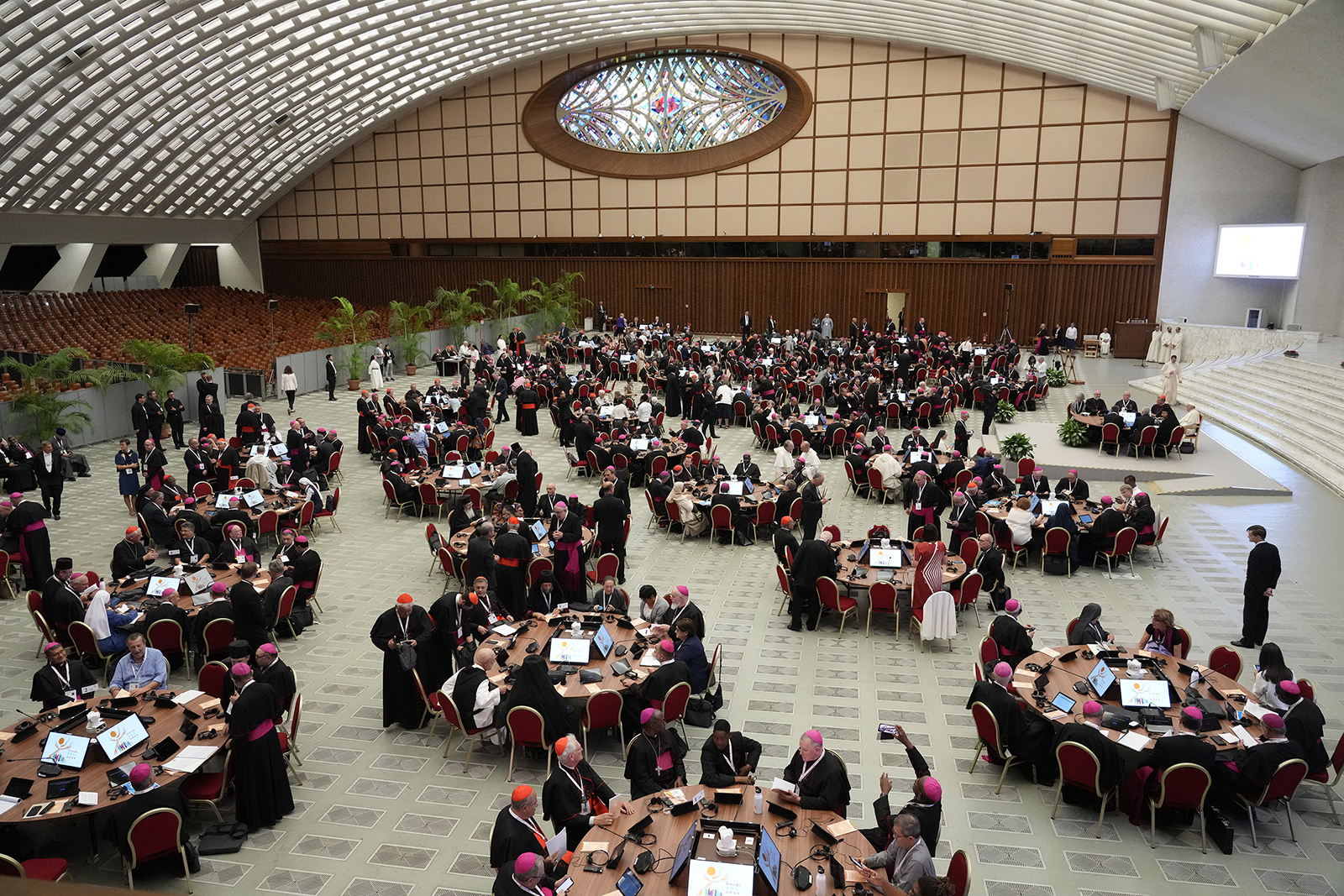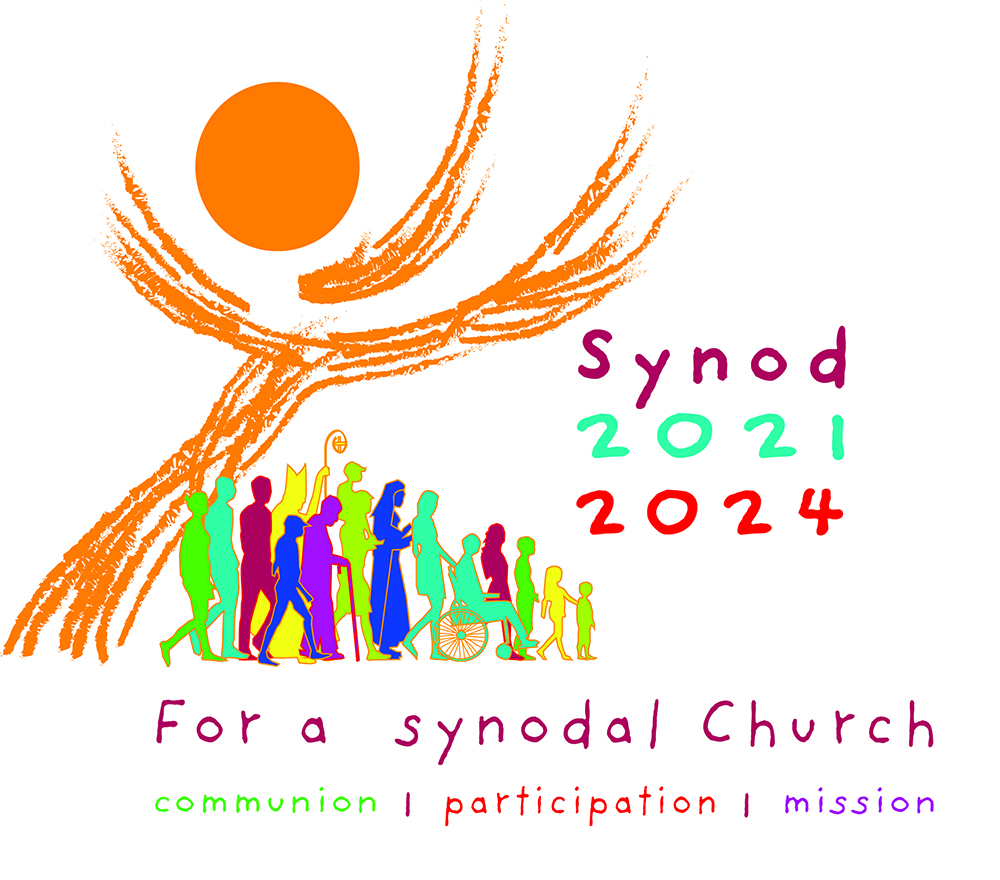
[ad_1]
VATICAN CITY (RNS) — After five days of meetings and an audience with Pope Francis in the past week (April 28-May 2), more than 200 parish priests from around the world are preparing to return home and bring the pope’s mission of synodality to their local communities.
The Rev. Clinton Ressler, a parish priest in Texas City, Texas, one of seven U.S. pastors at the International Meeting of Parish Priests this week, said the media often portray the synod not as an open dialogue the pope intended, but as an effort to change church doctrine.
“When it’s presented that way, I think it’s often disturbing, scary, unsettling,” Ressler said during a meeting with Vatican journalists Thursday (May 2). “I think that’s an unfair representation of what the synod actually is. It’s a much more practical, I’d say grassroots level, way to teach people how to do communitarian discernment and take responsibility for their parish and community.”
Ressler’s parish near Galveston has a tactical discernment team that works with the pastoral council to determine the goals of the community and how to implement them. “It’s been two years of struggle, but also deepening trust, deepening relationships and deepening vulnerability and learning how to be honest with your pastor,” he explained.
Ressler said he has learned the power of fostering dialogue and relationship during his 20-year tenure as the Catholic chaplain for the Houston Texans. “Sports teams have very small circles of trust,” he said, “but I’m pretty friendly. I’m Texan, after all!”
The meeting, which took place in Sacrofano, a small town north of Rome, was promoted by the Vatican’s Secretariat for the Synod and the Vatican department for clergy. The event, which also included the participation of the Vatican office for evangelization and relations with Eastern Orthodox churches, answered the call of the Synod of Bishops in October 2023 to engage with local parishes in the synodal efforts.

Pope Francis, sitting at right, participates in the opening session of the 16th General Assembly of the Synod of Bishops in the Paul VI Hall at the Vatican, Oct. 4, 2023. (AP Photo/Gregorio Borgia)
The Synod on Synodality began in October 2021 with a call for Catholic communities around the world to inquire for themselves what most concerned them. It’s the largest consultation of Catholic faithful in history, involving bishops, cardinals and ordinary faithful from the diocesan level to “continental assemblies” that have refined the questions for the synod meetings in Rome.
Francis, whose project it is, hopes to foster a spirit of unity in the church while addressing difficult questions ranging from leadership to lay participation and outreach to marginalized faithful.
After the Rome meeting last fall, bishops will convene for the second session of the synod in October, where they will work from a document summarizing the discussions so far. It will include the reports from the parish priests’ meeting and the discussions of the episcopal conferences. It will also report the work of the commissions of theologians and canon lawyers tasked by Francis to address complex issues, including the role of women in the church, LGBTQ inclusion and sexual abuse.
But while synodality has been amply discussed at the Vatican, in bishops’ conferences and lay organizations, its implications remain puzzling for many believers.
That’s where the parish priests come in, with the mandate from Francis to inject synodality in local communities’ experience of the church.
In Thursday’s closed-door meeting with Francis, parish priests shared their expectations and projects for synodality in their communities. In a separate “Letter of the Holy Father to the parish priests,” Francis underlined the crucial role of pastors in promoting communal discernment and building communities with other parish priests and bishops.

Synod on Synodality logo. (Courtesy image)
Francis invited the priests “to be missionaries of synodality, among yourselves and, once you return home, with your fellow parish priests.”
The parish priests who participated were selected by their national bishops’ conferences with the requirement that they be experienced in synodality and represent a diversity of backgrounds. According to the Vatican’s report on the meetings, they enjoyed sharing their experiences with others in the same position. While they expressed gratitude for their work, the report said, they also admitted to feelings of “burnout, overwhelmed by the demands placed upon them,” and “isolation.”
“In my experience, in the beginning I felt lonely,” said the Rev. Harry Quaedvlieg, who runs a parish in the Netherlands, in an interview on Thursday. “But in the process of synodality, of becoming ‘we,’ you don’t feel that lonely,” he added.
In the English-speaking groups, parish priests lamented shrinking church attendance and talked about how social media, catechism, initiatives that engage with people door to door and “the beauty and depth of the liturgy” have helped bring people to the pews and engage with parishes.
Quaedvlieg believes synodality will prove very useful in moments of crisis or challenges in the church. He experienced it himself during a period of church closures in his diocese, even though he said he didn’t know at the time that they were practicing synodality by opening up discussions with grieving or struggling parishioners.
“It took years to discover in the midst of our problems what needs to be our mission,” he said.
RELATED: The Catholic Church wants to have a say on the future of AI
The priests also said some pastors “lack interest in embracing initiatives” tied to synodality, while other faithful are fearful “about groups trying to hijack the process to bring about their own agendas,” and stated that bishops also have a great responsibility in building a “truly effective synodal church.”
“For many people synodality is something new in the church and you have to open up yourself a little bit and you don’t know what solution it will bring,” Quaedvlieg said.
For Ressler, the pushback against synodality from some priests is driven mostly by fear or misinformation. Unity is at the heart of the synod, he said: “We can’t go forward if we are divided.” The biggest challenge will be getting the faithful engaged with the project of synodality despite their initial hesitancies.
“I feel this responsibility,” he said. “What a privilege it has been for me to be one of the few people to participate in this. And now, what is going to be demanded to me by God? I’m going to have stand before God someday and say: ‘Did I take this gift that I received and do my best to share it with the entire people?’”
RELATED: Despair in the Holy Land
[ad_2]
Zita boo
Interesting